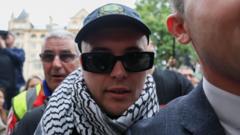Why Is Kneecap Rapper in Court Facing Terror Charges?

In a high-profile court case, Liam Óg Ó hAnnaidh, a member of the rap group Kneecap, is appearing at Westminster Magistrates' Court, facing allegations of displaying a flag in support of Hezbollah, a proscribed organisation in the UK, during a concert in London last year. The 27-year-old, known as Mo Chara, denies the charges, claiming they are politically motivated and aimed at silencing his group. The case has garnered significant public attention, with supporters rallying outside the court.
Last updated: 26 October 2023 (BST)
Key Takeaways
- Liam Óg Ó hAnnaidh is in court for allegedly displaying a Hezbollah flag.
- The rapper claims the case is politically motivated.
- Kneecap is known for its provocative lyrics and activism.
- Public support has been strong, with protests outside the court.
- The group has faced controversy over their political messages in music.
Background of the Case
The allegations against Ó hAnnaidh stem from an incident at a concert where he reportedly displayed a flag associated with Hezbollah. This act has triggered a legal battle, as Hezbollah is classified as a terrorist organisation in the UK under the Terrorism Act 2000. The Metropolitan Police launched an investigation after reviewing video footage from the event, leading to charges being filed against the rapper.
The Allegations and Defence
Ó hAnnaidh’s defence rests on the assertion that the charges are politically charged, asserting that they aim to suppress freedom of expression. He maintains that his actions were not intended to endorse Hezbollah, but rather to express solidarity with broader political movements. The case has sparked discussions around artistic expression, political statements, and the boundaries of free speech in the UK.
The Role of Public Order Laws
As the case unfolds, the Metropolitan Police have imposed Public Order Act conditions to manage protests outside the court. They have designated specific areas for supporters to gather, aiming to minimise disruption. These measures highlight the delicate balance between individual rights to protest and public order, particularly in high-profile cases like this.
Kneecap: A Brief Overview
Kneecap, formed in 2017, is an Irish-speaking rap trio consisting of Mo Chara, Móglaí Bap, and DJ Próvaí. Known for their bold lyrics and provocative merchandise, the group has made headlines for their engaging and often controversial performances. Their music often addresses political themes, reflecting the socio-political landscape in Northern Ireland and beyond.
Cultural Impact and Recognition
The group's rise to fame has inspired a semi-fictionalised film featuring Oscar-nominated actor Michael Fassbender, which won a British Academy of Film and Television Arts (BAFTA) award in February 2025. Their artistic contributions have not only entertained but also sparked important conversations about identity and politics in contemporary society.
Previous Controversies and Legal Battles
Kneecap has faced several controversies, including backlash over their comments regarding the war in Gaza during their performance at the prestigious Coachella music festival in April 2024. Their stance on political issues has drawn both support and criticism, illustrating the polarising nature of their artistry.
Additionally, in November 2024, the group successfully challenged a decision made by former minister Kemi Badenoch to withdraw an arts grant, further solidifying their position as a voice for artistic freedom. This legal victory has added to the narrative surrounding their current court battle, as fans and supporters rally behind their cause.
Public Support and Demonstrations
Outside Westminster Magistrates' Court, a large crowd has gathered to show support for Ó hAnnaidh. Many supporters are holding signs that read “Free Mo Chara” and waving flags associated with Palestine and Ireland. This public show of solidarity underscores the impact of Kneecap's music and its resonance with various social movements.
Community Response and Political Reactions
The reactions to the case are multifaceted, reflecting a mixture of support and criticism across the political spectrum. Supporters argue that the prosecution is an attempt to stifle dissent and political expression, while critics maintain that the law must be upheld, especially concerning organisations deemed a threat to national security.
What Happens Next?
The court proceedings are ongoing, with Ó hAnnaidh remaining on unconditional bail since his first appearance in June. The outcome of this case could have significant implications for Kneecap and similar artists who engage in political commentary through their work. It raises fundamental questions about the limits of artistic expression and the role of the state in regulating speech.
Conclusion
The case against Liam Óg Ó hAnnaidh is emblematic of larger societal issues regarding free speech, political expression, and the influence of art in activism. As the legal proceedings continue, the public will be watching closely to see how this situation unfolds and what it means for the future of political commentary in music.
With the ongoing tensions surrounding artistic expression and the potential ramifications of this case, it is a pivotal moment for both Kneecap and the wider music community. How this situation resolves could set a precedent for future cases involving political statements in the arts. #Kneecap #MoChara #FreeSpeech
FAQs
What are the charges against Liam Óg Ó hAnnaidh?
Liam Óg Ó hAnnaidh is charged with displaying a flag in support of Hezbollah, which is considered a proscribed organisation in the UK.
What is Kneecap known for?
Kneecap is an Irish-speaking rap group known for their provocative lyrics that often address political themes, particularly relating to Northern Ireland.
What is the significance of the protests outside the court?
The protests highlight public support for Ó hAnnaidh and raise awareness about issues related to free speech and artistic expression.
What legal precedents could this case set?
This case could influence future legal interpretations of free speech and artistic expression, especially in politically charged contexts.
How has Kneecap responded to controversies in the past?
Kneecap has faced various controversies but has often defended their right to express political views through their music, successfully challenging government decisions regarding funding.
Published: 2025-08-20 09:42:24 | Category: technology



